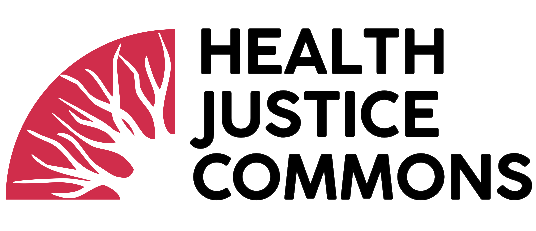Terms Defined
Medical Industrial Complex (MIC):
When most of us think of healthcare, we don’t think of the Medical Industrial Complex, which is comprised of interlocking institutions like big pharma, multi-billion dollar health insurance corporations, medical technology companies, and governmental regulatory bodies like the FDA and EPA. In actuality, these entangled institutions form the basis of US Healthcare. They also play a profoundly overlooked role in degrading national and global health, enabling climate change, and perpetuating racism, sexism, classism, homophobia, transphobia and ableism.
Big pharma corporations often own major agribusinesses, such as Bayer-Monsanto. It is part of the standard business model of these mega-corporations to manufacture known carcinogens like glyphosate (RoundUp), while simultaneously profiting off of cancer medications they also sell. Syngenta uses a similar model. Yet, these glaringly extractive and unjust practices are so well concealed and healthcare in the US and globally so hard to access, our communities have yet to take on the MIC. Further, with over 95% of the world’s population having 1 or more illness or disabilities, we are profoundly dependent on these systems. This dependency, however, is by design. The hidden history of the US healthcare system reveals that from the start its institutions were built in ways which mirror other industries to center profit and exploit vulnerable communities. US healthcare’s foremost engineers in the early 1900s were members of the Rockefeller, Carnegie, and Morgan families. You can learn more here and here, and by joining one of our courses.
Learn more about the racist roots of the modern gynecology* and how racism and other forms of oppression are endemic in the US healthcare system: here, here and here.
*CW: this article contains information overviewing the non-consensual experimentation on enslaved Black women.
Prison Industrial Complex (PIC):
Critical Resistance uses the term PIC to describe the overlapping interests of government and industry that use surveillance, policing, and imprisonment as solutions to economic, social and political problems.
People’s Science:
There are many ways of defining People’s Science. The Health Justice Commons believes:
people have the right and power to determine what is healthy. People have the right and power to generate knowledge. Community generated knowledge is powerful and legitimate.
This forms the basis of how we define People’s Science. In today’s society, scientific studies and technological development is nearly entirely in the hands of large corporations and institutions with limited public accountability or transparency. People’s Science calls for the democratic design of studies and real-world solutions which include the people most impacted in all levels of the development process and implementation. Data, or the products, practices or new technologies generated should be used in the service of social and environmental good. People’s Science looks to the natural world, the wisdom of ecosystems, and the planet itself to solve problems caused by human greed and address the planetary crisis we face. Finally, following the leadership of Indigenous communities, which is grounded in centuries-old principles of sustainability, health and resilience, and is often disruptive to some western science’s most harmful assumptions and practices, is foundational to People’s Science. The #GreenNewDeal, led by many Indigenous communities, or the creation of massive seed banks in resistance to agribusiness-driven GMOs in Indian, are powerful examples of People’s Science in action.
For more on People’s Science check out the powerful work of Dr. Ruha Benjamin, Dr. Alondra Nelson, Harriet Washington, and Dr. Deboleena Roy, scholars who strongly inform our work.
You can also check out the work of the Greater Good Science Center and learn more about India’s People's Science Movement in India.
Learn more about Indigenous ways of knowing here and here.
Popular Education:
Popular education is based upon the teaching and practices of Pablo Freire’s Pedagogy of the Oppressed. Freire believed that “knowledge emerges only through invention and re-invention, through the restless, impatient, continuing, hopeful inquiry human beings pursue in the world, with the world, and with each other.” Popular education is an interactive way of teaching and learning that empowers participants to co-create knowledge through reflective inquiry of the wisdom of our lived experiences combined with techniques to evaluate and critique already existing knowledge or what we have been taught is true. Popular education is also informed by the thinking and writing of bell hooks for whom “education is a practice of freedom.”
Somatics:
Our ally and movement partner, Generative Somatics, defines somatics as: a path, a methodology, a change theory, by which we can embody transformation, individually and collectively. Embodied transformation is foundational change that shows in our actions, ways of being, relating, and perceiving. It is transformation that sustains over time. Somatics pragmatically supports our values and actions becoming aligned. It helps us to develop depth and the capacity to feel ourselves, each other and life around us. Somatics builds in us the ability to act from strategy and empathy, and teaches us to be able to assess conditions and “what is” clearly. Somatics is a practice-able theory of change that can move us toward individual, community and collective liberation. Somatics works through the body, engaging us in our thinking, emotions, commitments, vision and action. Learn more.
Theatre of the Oppressed (TO):
Created by Augusto Boal, who believed theatre to be rehearsal for the revolution, Theatre of the Oppressed is a set of experiential practices for people to explore collective struggles, analyze their herstories and present circumstances, and then experiment with inventing a new future together through theater and performance. Learn more here or try TO with our collaborators, Partners For Collaborative Change.
